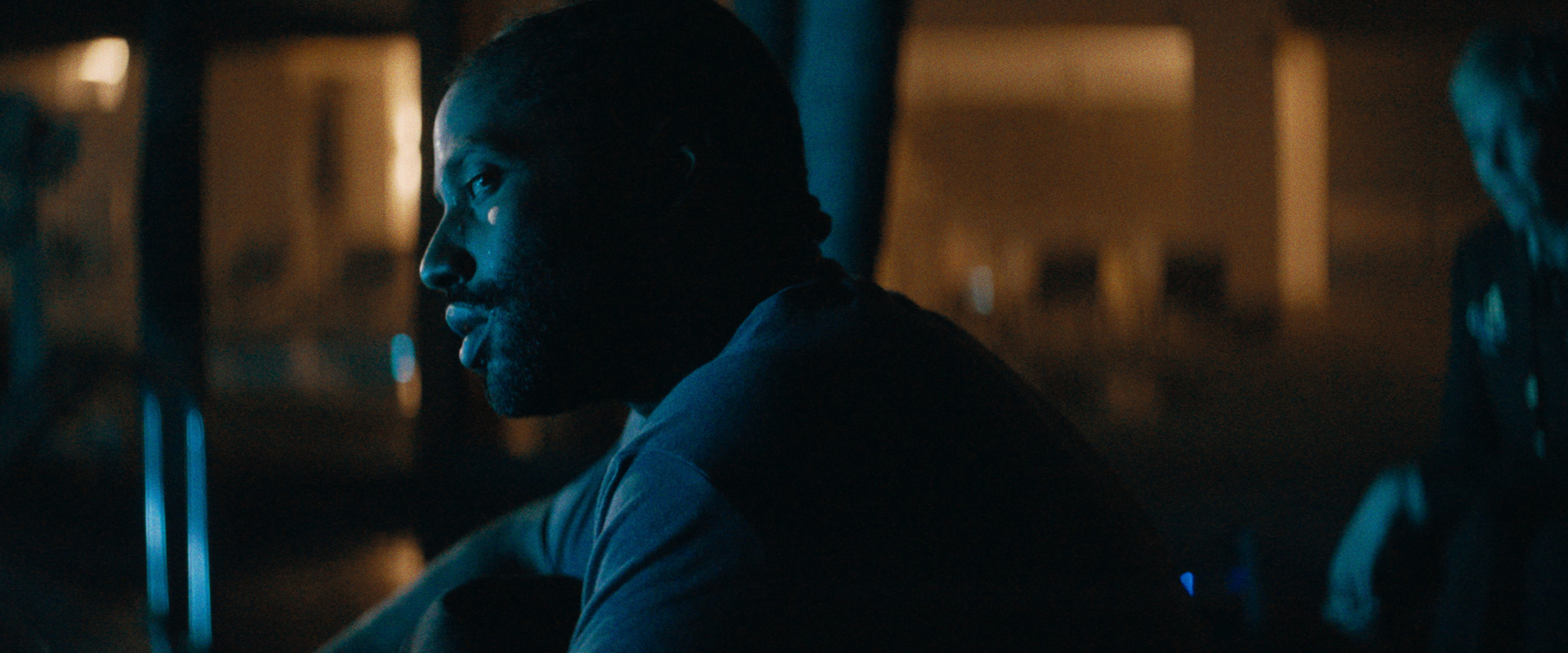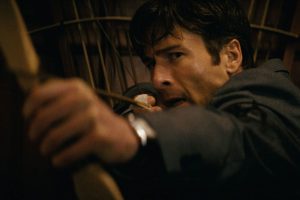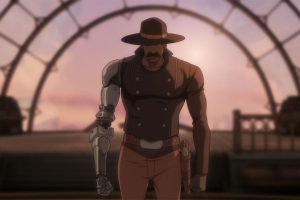
The Creator (2023)
This is a fight for our very existence.
Let’s get one thing out of the way first — The Creator, Godzilla director Gareth Edwards’ first film since he was relieved of command on Rogue One: A Star Wars Story, circa 2016, isn’t a bad film. It’s merely okay.
It is visually stunning, right enough, with Edwards bringing the guerrilla ethos that served him so well on his microbudget first feature, 2010’s lo-fi kaiju flick Monsters, to bear on a blockbuster-scale production. Back then he did the digital effects himself on his home computer; this time out he has ILM, Weta Workshop, and more on hand to wrangle the pixels and whatnot. The result is impressive, with the film’s science fiction elements blending seamlessly with the location photography. Shot in Thailand, The Creator presents us with a world in which high tech robots inhabit a recognizable Asian milieu, a new riff on the old “high tech lowlife” cyberpunk aesthetic.
40-odd years ago Blade Runner (1982) and Neuromancer (1984) presented us with futures dominated, culturally and economically, with an ascendant Japan, a manifestation of early ‘80s economic anxieties. Here, Edwards ostensibly gives us a future still suffering under American imperialism and military adventurism, as an anti- A.I. U.S. wages war on an Asian country — rather witlessly named “New Asia” — that has integrated artificial intelligence into its society and culture.
Which sounds cool and interesting and of the moment — Hollywood’s recent (and ongoing) industrial action has been fought, in part, over the question of how A.I. in its current form could be integrated into the creative process, and indeed whether it should. Ironically, if you told me The Creator was written by A.I., I might believe you. True, it’s gotten a lot of attention for being an “original” science fiction blockbuster, and if you take original to mean “not based on an extant franchise or IP” then, yes, that’s true — it is. If you take it to mean “doing something new and creative with the genre” then no, I have to disagree there.
Much like a Large Language Model can only extrapolate from pre-existing writing, Edwards and his co-writer, Chris Weitz, Rogue One: A Star Wars Story (2016), draw on a large array of influences but fail to synthesize them into anything new. Edwards himself cites Apocalypse Now (1979), Baraka (1992), Blade Runner, Akira (1988), Rain Man (1988), The Hit (1984), E.T. the Extra-Terrestrial (1982), and Paper Moon (1973), but we can add the paintings of Jakub Różalski, the retro-futurist aesthetic of the Fallout video game series (particularly in the opening prologue) and, indeed, the general thrust of sci-fi video game design in recent years. I keep coming back to Destiny 2 as an obvious touchstone.
But really, The Creator is most reminiscent of sci-fi films like Elysium (2013) and Oblivion (2013) — well-designed, undemanding movies that are entertaining enough but take a ham-fisted stab at being about something deep, man, and whose themes, narratives, and fictional worlds fall apart on close examination. The Creator attempts to wrestle with notions of identity, humanity, the fear of emerging technology, and Western political and military oppression, but it does so in the shallowest of ways. Charitably, you could say these themes are merely part of the overall aesthetic — that these sorts of near future dystopian films generally deal with these sort of subjects, so this one does too, just to stay within the lines.
It’s 2065 or thereabouts and the Global West is 15 years deep into a genocidal war against artificial intelligence (robots — the notion of distributed or non-physical A.I. is sidestepped) after one nuked Los Angeles. Our hero is former special forces soldier Joshua Taylor (John David Washington), who is pulled out of retirement for the requisite One Last Job: find and destroy a new weapon developed by Nirmata, the semi-legendary architect of A.I. technology. Joshua has skin in the game; not only did he lose his family (and two limbs — he wears robot prostheses) in the destruction of L.A., but five years previously he was undercover in New Asia, hunting down Nirmata. In point of fact, he married a human woman, Maya (Gemma Chan), purported to Nirmata’s daughter. She was killed in a U.S. attack, along with their unborn child. Joshua’s military masters, in the form of General Andrews (Ralph Ineson) and the fanatically anti-robot Colonel Howell (a disappointingly one-note Allison Janney) out the hook in him by showing footage of a seemingly alive Maya. And so off he goes. We later learn that it’s common for pro-A.I. humans to “donate” their likenesses for robots to wear, which is something he should, by rights, know. But he either doesn’t know or doesn’t care, and we’re encouraged not to think about it.
After the mission goes predictably pear-shaped, Joshua finds himself cut off and on the run in New Asia with the ostensible weapon, a robot in the form of a child he calls Alphie (Madeleine Yuna Voyles, who is very good in the role). She can control technology somehow, hence her designation as a weapon. Why the A.I.s of New Asia build new droids in the shape of children is unexamined, but personally I’m a sucker for the tough guy/cute kid dynamic, and so too is Joshua. What are the odds that he’ll bond with her and question his allegiances and worldview? What are the odds that you’ve seen this all before?
Pretty good, folks, pretty good, and it was better when it was Logan (2017).
I tend to come at movies emotion-first, and if you get me on that level, I’ll forgive a lot. The Creator never manages to do that. Joshua remains a cipher, but one we can project motives onto if we care. You can imagine he’s feeling guilt over his hand in Maya’s death and his betrayal of the friends he made while undercover, but neither the script nor Washington’s performance do anything to justify that take. His emotional journey makes little sense. Initially he is completely convinced that A.I.s have no claim to personhood, that they are merely very good mimics of human emotion, and while he changes his stance, his choice to do so is never dramatized. By the time the third act rolls around he is completely willing to sacrifice himself for Alphie in particular and the A.I. cause in general, and while you can point at various elements in the narrative to justify why, the emotional truth of his choices remains elusive.
Robbed of that emotional connection, I’m left to focus my attention on the world of the story, which falls apart under scrutiny. The entire New Asia conceit smacks of Orientalism, a way to smash together various Eastern ideas and images without considering their compatibility and cultural specificity. The technology makes no sense; while I can groove on the image of Alphie watching old cartoons on a CRT television, it’s an image that exists because it looks cool rather than rings true in the context of the fictional world we’re seeing. Likewise, the robot suicide bombers the West employs in one scene, and likewise the grenade we see that has a visible digital countdown display (I keep coming back to that one — there is a very concrete and obvious reason why you don’t want anyone you’re hucking a grenade at to know how long they’ve got until it goes off).
Not every detail needs to be explained, of course, and so much great sci-fi, from Star Wars to Blade Runner, resonates in part because it skillfully invites us to imagine the world outside the frame of the camera. But with The Creator, the unexplained details stand out as either gaps in the film’s logic, or else the possibility of a more interesting story being withheld from us. The robot Buddhist monks we encounter at one point is a striking example of the latter. There’s probably a good story to be told about how artificial intelligences might approach spirituality, but The Creator isn’t it, for all that it lightly references both Eastern and Western religions in naming its characters.
It’s all surface, is what I’m saying, but the surface is so pretty that it justifies three stars rather than two. I don’t know, maybe we’ve been subjected to so much horrible CGI and slapdash cinematography in recent blockbusters (coughmarvelcough) that the fact that The Creator looks so good is enough to justify the deification I’ve seen in some circles. Sometimes the aesthetic is enough; I don’t think Jupiter Ascending (2015) is a great film, but I’ll throw it on once in a while because it looks like nothing else out there. I suspect that, down the track, The Creator will get the same treatment from me. All other considerations aside, the fact that Edwards made something that looks like this for $80 million should have us side-eyeing the uglier members of $200m+ club. But, at the end of the day, this is an album you buy for the cover art but never actually want to listen to.
3 / 5 – Good
Reviewed by Travis Johnson
The Creator is released through 20th Century Fox Australia








